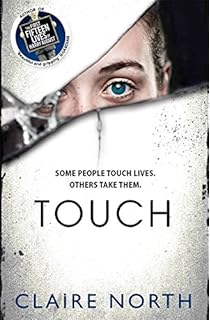Everyone needs a hobby, and everyone was mine. [p. 67]Somewhere in London, in a dark alley, in the past, a woman is murdered. But she doesn't want to die alone: she reaches out and touches her murderer ... and becomes him, looking down at the corpse of his victim.
Now the entity known as Kepler is a ghost, moving between -- 'wearing' -- bodies, generally benevolent. A former host won't be able to remember the past few minutes, or days, or years: but chances are they'll have benefitted, either financially (Kepler likes to leave behind cash) or in other ways. Kepler can get a nervous patient to the hospital; get a terrified witness into court to testify; sit an exam; leave a lover ... Sometimes the 'host-ghost' arrangement is consensual, such as the arrangement that Kepler has with Josephine Cebula, a Polish prostitute. In exchange for three months' use of Josephine's body, Kepler will give her a new passport, a new identity, a fresh start and ten thousand euros. Oh, and Josephine will no longer be a smoker.
And then Josephine is killed in Istanbul: and Kepler, 'travelling by touch', fleeing from body to body, knows that they were the intended victim. But why kill Josephine when Kepler's already left?
Kepler's pursuit of the assassin -- and then of the mastermind behind the assassination -- takes them from Istanbul to Bratislava, Vienna, Berlin, Paris. Along the way, old friends and enemies are encountered, and it becomes increasingly obvious that somebody is killing ghosts.
I've read quite a few novels about body-swapping -- body snatchers, if you like, or possession if you're feeling old-fashioned. (A few that come to mind are Iain Banks' Transition, David Levithan's Every Day, Stephenie Meyer's The Host, David Mitchell's The Bone Clocks.) I can't recall an entity so physically embodied as Kepler. Kepler notices, and loves, the flaws and graces of each body they inhabit: the gum disease, the tension in the shoulder blades, the bite of an over-tight bra strap, the dry itch of lesions. And Kepler's love for human beings, in all humanity's glorious variation, informs their former career: that of 'estate agent', or provider of carefully-selected hosts to other ghosts.
Touch is a labyrinthine novel: Kepler's story is told in frequent flashbacks (with a virtuousic ear for period- and setting-appropriate dialogue) and it takes a while for their character, and the experiences that have shaped them, to become clear. Each glimpse of another body's life, or of Kepler encountering another, effectively immortal, ghost, adds clarity and perspective.
Claire North explores many aspects of ghost-life. Gender issues are ... not ignored, but Kepler doesn't have much of a gender identity, and seems less interested in sex than some of their peers. More attention is given to the issues of immortality: suicide, death, murder, boredom, madness -- and offspring of the body versus those of the soul. Intriguing vignettes illustrate why 'normal' humans might want to hire a ghost to inhabit themselves, or someone close to them. The fight scenes, with Kepler flitting from body to body, are amazing. And some of the ways that Kepler devises to get around the problems of their situation (how do you carry something with you when you go? how do you keep a host from raising the alarm? how do you make yourself known?) are brilliant.
I really enjoyed this novel. It's beautiful, tragic, inventive and provocative: and it made me mindful, in several senses, of my own physical reality.

No comments:
Post a Comment